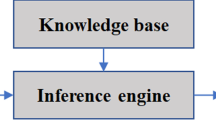Abstract
This paper presents an online self-evolving fuzzy controller with global learning capabilities. Starting from very simple or even empty configurations, the controller learns from its own actions while controlling the plant. It applies learning techniques based on the input/output data collected during normal operation to modify online the fuzzy controller’s structure and parameters. The controller does not need any information about the differential equations that govern the plant, nor any offline training. It consists of two main blocks: a parameter learning block that learns proper values for the rule consequents applying a local and a global strategy, and a self-evolving block that modifies the controller’s structure online. The modification of the topology is based on the analysis of the error surface and the determination of the input variables which are most responsible for the error. Simulation and experimental results are presented to show the controller’s capabilities.
















Similar content being viewed by others
Explore related subjects
Discover the latest articles, news and stories from top researchers in related subjects.References
Angelov P (2004) A fuzzy controller with evolving structure. Inform Sci 161(1–2):21–35
Cara AB, Lendek Zs, Babuska R, Pomares H, Rojas I (2010) Online self-organizing adaptive fuzzy controller: application to a nonlinear servo system. In: Proceedings of 2010 IEEE world congress on computational intelligence, pp 2491–2498
Castro J (1995) Fuzzy logic controllers are universal approximators. IEEE Trans Syst Man Cybern 25(4):629–635
Chen CH, Lin CJ, Lin CT (2009) Nonlinear system control using adaptive neural fuzzy networks based on a modified differential evolution. IEEE Trans Syst Man Cybern C 39(4):459–473
Galluzzo M, Cosenza B (2009) Control of the biodegradation of mixed wastes in a continuous bioreactor by a type-2 fuzzy logic controller. Comput Chem Eng 33(9):1475–1483
Gao Y, Er MJ (2003) Online adaptive fuzzy neural identification and control of a class of MIMO nonlinear systems. IEEE Trans Fuzzy Syst 11(4):462–477
Gao Y, Er MJ (2005) An intelligent adaptive control scheme for postsurgical blood pressure regulation. IEEE Trans Neural Netw 16(2):475–483
Hoffmann F, Nelles O (2001) Genetic programming for model selection of TSK-fuzzy systems. Inform Sci 136(1–4):7–28
Lalouni S, Rekioua D, Rekioua T, Matagne E (2009) Fuzzy logic control of stand-alone photovoltaic system with battery storage. J Power Sources 193(2):899–907
Lee C (1990) Fuzzy logic in control systems: fuzzy logic controller. II. IEEE Trans Syst Man Cybern 20(2):419–435
Li C, Lee C (2003) Self-organizing neuro-fuzzy system for control of unknown plants. IEEE Trans Fuzzy Syst 11(1):135–150
Lin C, Xu Y (2006) A novel genetic reinforcement learning for nonlinear fuzzy control problems. Neurocomputing 69(16–18):2078–2089
Lin CT, Lin CJ, Lee CSG (1995) Fuzzy adaptive learning control network with on-line neural learning. Fuzzy Sets Syst 71(1):25–45
Liu Y, Zheng Y (2009) Adaptive robust fuzzy control for a class of uncertain chaotic systems. Nonlinear Dyn 57(3):431–439
Mingzhi H, Jinquan W, Yongwen M, Yan W, Weijiang L, Xiaofei S (2009) Control rules of aeration in a submerged biofilm wastewater treatment process using fuzzy neural networks. Expert Syst Appl 36(7):10428–10437
Mucientes M, Casillas J (2007) Quick design of fuzzy controllers with good interpretability in mobile robotics. IEEE Trans Fuzzy Syst 15(4):636–651
Park J, Park G, Kim S, Moon C (2005) Direct adaptive self-structuring fuzzy controller for nonaffine nonlinear system. Fuzzy Sets Syst 153(3):429–445
Phan PA, Gale TJ (2008) Direct adaptive fuzzy control with a self-structuring algorithm. Fuzzy Sets Syst 159(8):871–899
Pomares H, Rojas I, Ortega J, Gonzalez J, Prieto A (2000) A systematic approach to a self-generating fuzzy rule-table for function approximation. IEEE Trans Syst Man Cybern B 30(3):431–447
Pomares H, Rojas I, Gonzalez J, Prieto A (2002a) Structure identification in complete rule-based fuzzy systems. IEEE Trans Fuzzy Syst 10(3):349–359
Pomares H, Rojas I, Gonzalez J, Rojas F, Damas M, Fernandez FJ (2002b) A two-stage approach to self-learning direct fuzzy controllers. Int J Approx Reason 29(3):267–289
Pomares H, Rojas I, Gonzalez J, Damas M, Pino B, Prieto A (2004) Online global learning in direct fuzzy controllers. IEEE Trans Fuzzy Syst 12(2):218–229
Rojas I, Pomares H, Ortega J, Prieto A (2000) Self-organized fuzzy system generation from training examples. IEEE Trans Fuzzy Syst 8(1):23–36
Rojas I, Pomares H, Gonzalez J, Herrera L, Guillen A, Rojas F, Valenzuela O (2006) Adaptive fuzzy controller: Application to the control of the temperature of a dynamic room in real time. Fuzzy Sets Syst 157(16):2241–2258
Wang D, Zeng XJ, Keane JA (2008a) An incremental construction learning algorithm for identification of T-S fuzzy systems. In: Proceeding of 2008 IEEE international conference on fuzzy systems (FUZZ 2008), vol 1–5, pp 1662–1668
Wang W, Chien Y, Li I (2008b) An on-line robust and adaptive T-S fuzzy-neural controller for more general unknown systems. Int J Fuzzy Syst 10(1):33–43
Ying H (2000) Fuzzy control and modeling: analytical foundations and applications. Wiley-IEEE Press, New York
Acknowledgments
This work has been partially supported by the Spanish Junta de Andalucía, Consejería de Innovación, Ciencia y Empresa, under Projects nos. TIC02906 and P07-TIC-02768, and by the Spanish MICINN Project no. SAF2010-20558.
Author information
Authors and Affiliations
Corresponding author
Appendix
Appendix
The nonlinear servo system used for the experimentation in Sect. 6.2 is modeled by the following differential equations:
where \({\mathbf{x}} = \left[ \begin{array}{ll}\theta&\dot{\theta}\\ \end{array}\right]^T \in {\mathbb{R}}^2\) is the state of the plant, given by the angle θ and the angular velocity \(\dot{\theta}\), u is the control input, and G is the gravity term. The plant’s output is the angle θ. The meaning and values of the parameters used for the DC motor are given in Table 4.
As mentioned before, the proposed OSEFC does not require the differential equations that govern the plant to be controlled. However, we have included this information in this appendix with the purpose of allowing the interested reader to simulate the experiment.
Rights and permissions
About this article
Cite this article
Cara, A.B., Pomares, H., Rojas, I. et al. Online self-evolving fuzzy controller with global learning capabilities. Evolving Systems 1, 225–239 (2010). https://doi.org/10.1007/s12530-010-9016-8
Received:
Accepted:
Published:
Issue Date:
DOI: https://doi.org/10.1007/s12530-010-9016-8




